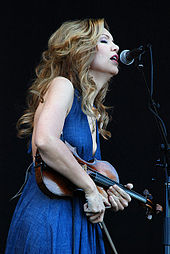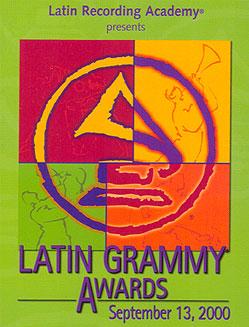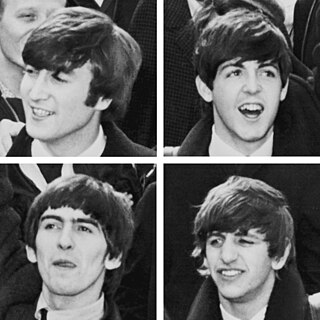Recipients






^[I] Each year is linked to the article about the Grammy Awards held that year.
| Grammy Award for Best Pop Collaboration with Vocals | |
|---|---|
| Awarded for | Quality collaborative pop performances with vocals |
| Country | United States |
| Presented by | National Academy of Recording Arts and Sciences |
| First awarded | 1995 |
| Last awarded | 2011 |
| Website | grammy.com |
The Grammy Award for Best Pop Collaboration with Vocals was an honor presented at the Grammy Awards, a ceremony that was established in 1958 and originally called the Gramophone Awards, [1] to recording artists for quality pop songs on which singers collaborate. Awards in several categories are distributed annually by the National Academy of Recording Arts and Sciences of the United States to "honor artistic achievement, technical proficiency and overall excellence in the recording industry, without regard to album sales or chart position." [2]
The award for Best Pop Collaboration with Vocals was first presented to Al Green and Lyle Lovett at the 37th Grammy Awards (1995) for the song "Funny How Time Slips Away". According to the category description guide for the 52nd Grammy Awards, the award was presented to artists that performed "newly recorded collaborative pop performances" that "do not normally perform together." [3]
In 1997, the father-daughter duo of Nat King Cole and Natalie Cole won the award for "When I Fall in Love", a "virtual duet" remake of one of his signature hits, using a recording of his vocals more than 30 years after his death in 1965. [4]
There have been five instances in which an artist was nominated for more than one song in the same year, with different collaborators. In 1998, Barbra Streisand received nominations for the songs "I Finally Found Someone" (with Bryan Adams) and "Tell Him" (with Celine Dion). Santana was nominated in 2000 for the songs "Love of My Life" (with Dave Matthews) and "Smooth" (with Rob Thomas). In 2002, Christina Aguilera was nominated for the songs "Nobody Wants to Be Lonely" (Ricky Martin) and "Lady Marmalade" (with Lil' Kim, Mýa and Pink). In 2005, Ray Charles earned nominations for the songs "Sorry Seems to Be the Hardest Word" (with Elton John) and "Here We Go Again" (with Norah Jones). In 2010, Colbie Caillat was nominated for the songs "Breathe" (with Taylor Swift) and "Lucky" (with Jason Mraz). Four of the five won the award with one of their two nominations (Santana's "Smooth"; Aguilera's "Lady Marmalade"; Charles's "Here We Go Again"; and Caillat's "Lucky").
Two-time award recipients include Van Morrison, Pink, Santana, Alison Krauss, and Robert Plant. Krauss and Plant are the only duo to win more than once, as well as the only consecutive winners. Christina Aguilera and Stevie Wonder share the record for the most nominations, with six each.
The award was discontinued in 2012 in a major overhaul of Grammy categories. At that point, all duo or group performances in the pop category were shifted to the newly formed Best Pop Duo/Group Performance category. The 2011 award for a cover version of "Imagine" was the last one to be awarded in the Best Pop Collaboration with Vocals category. [5]






^[I] Each year is linked to the article about the Grammy Awards held that year.
The Grammy Award for Best Rock Instrumental Performance was an honor presented to recording artists for quality instrumental rock performances at the Grammy Awards, a ceremony that was established in 1958 and originally called the Gramophone Awards. Honors in several categories are presented at the ceremony annually by the National Academy of Recording Arts and Sciences of the United States to "honor artistic achievement, technical proficiency and overall excellence in the recording industry, without regard to album sales or chart position".
The Grammy Award for Best Song Written for Visual Media is the Grammy Awards awarded to songs written for films, television, video games or other visual media.
The Grammy Award for Best Country Collaboration with Vocals was an honor presented at the Grammy Awards, a ceremony that was established in 1958 and originally called the Gramophone Awards, to quality country music collaborations for artists who do not normally perform together. Honors in several categories are presented at the ceremony annually by the National Academy of Recording Arts and Sciences of the United States to "honor artistic achievement, technical proficiency and overall excellence in the recording industry, without regard to album sales or chart position".
The Grammy Award for Best Dance/Electronic Recording is an award presented at the Grammy Awards, a ceremony that was established in 1958 and originally called the Gramophone Awards, to recording artists for works containing quality vocal performances in the dance music and/or electronic music genres. Honors in several categories are presented at the ceremony annually by the National Academy of Recording Arts and Sciences of the United States to "honor artistic achievement, technical proficiency and overall excellence in the recording industry, without regard to album sales or chart position".

The Grammy Award for Best Metal Performance is an award presented at the Grammy Awards to recording artists for works containing quality performances in the heavy metal music genre. The Grammy Awards is an annual ceremony, where honors in several categories are presented by The Recording Academy of the United States to "honor artistic achievement, technical proficiency and overall excellence in the recording industry, without regard to album sales or chart position". The ceremony was established in 1958 and originally called the Gramophone Awards.

The Grammy Award for Best Pop Vocal Album is an honor presented at the Grammy Awards, a ceremony that was established in 1958 and originally called the Gramophone Awards, to recording artists for quality vocal pop music albums. Awards in several categories are distributed annually by the National Academy of Recording Arts and Sciences of the United States to "honor artistic achievement, technical proficiency and overall excellence in the recording industry, without regard to album sales or chart position."
The Grammy Award for Best Female Rap Solo Performance was an honor presented to female recording artists at the 45th Grammy Awards in 2003 and the 46th Grammy Awards in 2004 for quality rap solo performances. The Grammy Awards, an annual ceremony that was established in 1958 and originally called the Gramophone Awards, are presented by the National Academy of Recording Arts and Sciences of the United States to "honor artistic achievement, technical proficiency and overall excellence in the recording industry, without regard to album sales or chart position".
The Grammy Award for Best Male Rap Solo Performance was an honor presented to male recording artists at the 45th Grammy Awards in 2003 and the 46th Grammy Awards in 2004 for quality rap solo performances. The Grammy Awards, an annual ceremony that was established in 1958, and originally called the Gramophone Awards, are presented by the National Academy of Recording Arts and Sciences of the United States to "honor artistic achievement, technical proficiency and overall excellence in the recording industry, without regard to album sales or chart position".
The Grammy Award for Best Traditional Pop Vocal Album is an award presented to recording artists at the Grammy Awards, a ceremony that was established in 1958 and originally called the Gramophone Awards. Honors in several categories are presented at the ceremony annually by the National Academy of Recording Arts and Sciences of the United States to "honor artistic achievement, technical proficiency and overall excellence in the recording industry, without regard to album sales or chart position".
The Latin Grammy Award for Best Female Pop Vocal Album was an honor presented annually at the Latin Grammy Awards from 2001 to 2011 The award was given to a female performer for albums containing at least 51 percent of new recordings of the pop genre. Since its inception, the award category has had several name changes. In 2000 was known as Best Female Pop Vocal Performance, being awarded for singles or tracks. The following year onwards the award for Best Female Pop Vocal Album was presented.
The Latin Grammy Award for Best Pop Vocal Album was an honor presented at the 1st Latin Grammy Awards, a ceremony that recognizes excellence and creates a wider awareness of cultural diversity and contributions of Latin recording artists in the United States and internationally. The award was given to performers for albums containing at least 51% of new recordings of the pop genre. The award category was given only the first year that the Latin Grammy Awards were presented, along with two more categories Best Female and Best Male Pop Vocal Performance, which were created to recognize excellence for singles or album tracks. Starting from the 2nd Latin Grammy Awards both categories were changed, creating Best Female and Best Male Pop Vocal Album.
The Latin Grammy Award for Best Male Pop Vocal Album was an honor presented annually at the Latin Grammy Awards from 2001 to 2011. The award was given to a male performer for albums containing at least 51% of new recordings of the pop genre. Since its inception, the award category has had several name changes. In 2000 it was presented as Best Male Pop Vocal Performance. The following year onwards the award is known as Best Male Pop Vocal Album.

The 1st Annual Latin Grammy Awards were held in Los Angeles at the Staples Center on Wednesday, September 13, 2000. The big winners were Luis Miguel, Santana and Maná with 3 awards; Juan Luis Guerra, Shakira, Fito Páez and Emilio Estefan Jr. received 2 awards each.
The Latin Grammy Award for Best Pop Album by a Duo or Group with Vocals was an honor presented annually at the Latin Grammy Awards between 2001 and 2011.The award was given to duos or groups for albums containing at least 51% of new recordings of the pop genre. In 2000 an award known as Best Pop Performance by a Duo/Group with Vocal was presented. From 2001 to 2011 the award for Best Pop Album by a Duo or Group with Vocals was presented.
The Grammy Award for Best Tropical Latin Album is an award presented at the Grammy Awards, a ceremony that was established in 1958 and originally called the Gramophone Awards, to recording artists for releasing albums in the tropical latin music genres. Honors in several categories are presented at the ceremony annually by the National Academy of Recording Arts and Sciences of the United States to "honor artistic achievement, technical proficiency and overall excellence in the recording industry, without regard to album sales or chart position".

The Grammy Award for Best Pop Duo/Group Performance is an award presented at the Grammy Awards, a ceremony that was established in 1958 and originally called the Gramophone Awards.

The Grammy Award for Best Rock Performance is an award presented at the Grammy Awards, a ceremony that was established in 1958 and originally called the Gramophone Awards. According to the 54th Grammy Awards description guide it is designed for solo, duo/groups or collaborative rock recordings and is limited to singles or tracks only.

The Grammy Award for Best Country Duo/Group Performance is an award presented at the Grammy Awards, a ceremony that was established in 1958 and originally called the Gramophone Awards. It was first awarded in 2012, after a major overhaul of Grammy Award categories. The award combines the previous categories for Best Country Performance by a Duo or Group with Vocal, Best Country Collaboration with Vocals and Best Country Instrumental Performance. The restructuring of these categories was a result of the Recording Academy's wish to decrease the list of categories and awards.
The Latin Grammy Award for Best Traditional Pop Vocal Album is an award presented at the Latin Grammy Awards since 2012. The award replaced the previous awards for Best Female Pop Vocal Album, Best Male Pop Vocal Album and Best Pop Album by a Duo or Group with Vocals. According to the Latin Grammy category definitions, it is designed "For albums containing 51% or more playing time of newly recorded material and 51% playing time of Traditional Pop music. Albums must also contain 51% or more playing time of vocal tracks. For solo artists, duos or groups."
The Latin Grammy Award for Best Urban/Fusion Performance is an honor presented annually by the Latin Academy of Recording Arts & Sciences at the Latin Grammy Awards, a ceremony that recognizes excellence and promotes a wider awareness of cultural diversity and contributions of Latin recording artists in the United States and internationally.
Specific
General